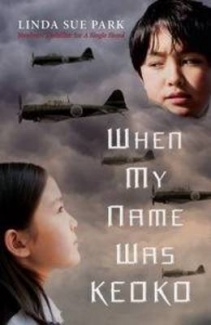When my name was Keoko by Linda Sue Park

University of Queensland Press, 2013. ISBN 9780702249747.
Daily life for Sun Hee and her family becomes almost intolerable
when the Japanese invade Korea during the Second World War. Hungry
for resources to supply the war effort, the brutal new masters strip
the local population of food, possessions and even young men to fill
the ranks of their army. When the dictatorial regime becomes so
oppressive that the Korean citizens are ordered to change their
names and speak Japanese, tensions develop in Sun Hee's family as
they struggle to maintain their security and identity.
This story is told over several years from the perspective of Sun
Hee, an obedient and dutiful daughter with contributions from her
older brother Tae Yul who displays understandable anger and
resentment towards the new regime. The reader feels great sympathy
for this close knit and loving family which had been leading a
simple, wholesome and fulfilling existence before their country was
annexed.
Readers are led gently down a path which prompts the deep
consideration of what constitutes honourable and courageous
behaviour in opposition to tyrannical rule. The impotent rage of the
teenager is presented side by side with the undeniable courage of
the uncle who actively works in resistance and risks violent death
in doing so. The children's father shows a different sort of courage
however as he personally accepts humiliation but must also counsel
his family members to meekly accept ignominy and exploitation to
preserve their safety. Female characters such as Sun Hee, her mother
and neighbours demonstrate their bravery in different ways, defying
their rulers and choosing to protect the weak rather than submit to
bullying abusers of power.
Characters who comply with the Japanese are not presented as
traitors but as victims of circumstance who are perhaps less stoic
and robust as their peers who seethe against the regime. Readers
cannot help but ponder their own courage under such oppressive
circumstance and consider at what point the hunger of their children
(or themselves) would cause them to buckle.
There is a sense of hope which prevails throughout this story and
whilst the family endures devastating events which bed the narrative
down in reality, it does not degenerate into a traumatic tale of
familial or national ruin.
Rob Welsh